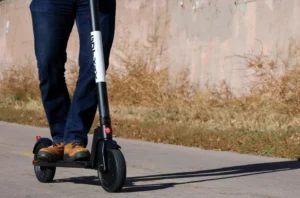Selecting the right bicycle can significantly enhance your cycling experience, whether you’re commuting, exercising, or enjoying leisure rides.
This article will compare folding bicycles and hybrid bicycles, highlighting their unique features, benefits, and ideal use cases to help you make an informed decision.
1. Design and Structure
Folding Bicycles:
- Compact and Portable: Folding bicycles are designed to fold into a compact size, making them easy to carry, store, and transport. This feature is particularly useful for urban commuters and travelers.
- Variety of Folding Mechanisms: These bikes come with different folding mechanisms such as mid-fold, vertical fold, and triangle hinge, catering to various needs and preferences.
- Versatility: Built for versatility, folding bikes are suitable for commuting, leisure rides, and light touring.
Hybrid Bicycles:
- Combination Design: Hybrid bicycles combine features of road bikes and mountain bikes, offering a balance of comfort, speed, and versatility.
- Flat Handlebars: Typically equipped with flat handlebars for a more upright and comfortable riding position.
- Moderate Tires: Feature tires that are wider than road bike tires but narrower than mountain bike tires, providing good traction and comfort on a variety of surfaces.
2. Use Cases
Folding Bicycles:
- Urban Commuting: Ideal for city dwellers who need a convenient and portable mode of transportation. They can be easily taken on public transport and stored in small spaces.
- Travel: Perfect for travelers who want to explore new places by bike without the hassle of transporting a full-sized bicycle.
- Recreational Riding: Suitable for casual rides in parks, neighborhoods, and bike paths.
Hybrid Bicycles:
- Commuting: Excellent for commuting, offering a comfortable and efficient ride on city streets and bike paths.
- Fitness and Exercise: Ideal for fitness enthusiasts who want a bike that can handle a variety of terrains and riding conditions.
- Leisure and Touring: Great for longer rides, including weekend tours and recreational cycling, on a mix of paved and unpaved surfaces.
3. Performance
Folding Bicycles:
- Speed and Comfort: Generally not built for high-speed performance but rather for convenience and versatility. Some models offer multi-speed options to handle varied terrain.
- Ride Quality: Smaller wheels and a compact frame can affect ride quality, but high-end models often incorporate features like suspension to enhance comfort.
Hybrid Bicycles:
- Balanced Performance: Offer a balanced performance, providing good speed on paved roads and adequate handling on light off-road trails.
- Comfort and Stability: Designed for comfort with features like a more upright riding position and shock-absorbing elements such as suspension forks or seat posts.
- Versatile Handling: Can handle a variety of terrains, making them suitable for mixed-surface rides.
4. Maintenance and Durability
Folding Bicycles:
- Regular Maintenance: Require regular maintenance, particularly of the folding mechanisms to ensure smooth operation and longevity.
- Durability: Built to be durable, but the folding joints and hinges can be points of wear and potential failure if not properly maintained.
Hybrid Bicycles:
- Low to Moderate Maintenance: Easier to maintain than mountain bikes, with fewer components to adjust and service. Regular maintenance includes keeping the drivetrain clean and properly lubricated.
- Durability: Constructed to withstand daily use and a variety of riding conditions, hybrids are generally durable and reliable.
5. Cost
Folding Bicycles:
- Price Range: Prices vary widely based on brand, quality, and features. Entry-level models are affordable, while high-end models with advanced features can be quite expensive.
- Value for Money: Offer excellent value for those who need a versatile and portable bike for commuting and travel.
Hybrid Bicycles:
- Price Range: Hybrid bikes also vary widely in price, from budget-friendly options to high-end models with advanced components.
- Investment in Versatility: Higher-end hybrids come with better materials and components, offering superior performance and comfort for a variety of riding conditions.
Conclusion
Choosing between a folding bicycle and a hybrid bicycle depends largely on your specific needs and riding goals.
If you require a bike for commuting, travel, or storage in tight spaces, a folding bicycle provides unmatched convenience and versatility.
Conversely, if you seek a bike that offers a balance of speed, comfort, and versatility for commuting, fitness, and recreational riding, a hybrid bicycle is an excellent choice.
Consider your primary use case, budget, and personal preferences to make the best decision for your cycling lifestyle.



